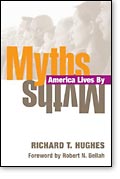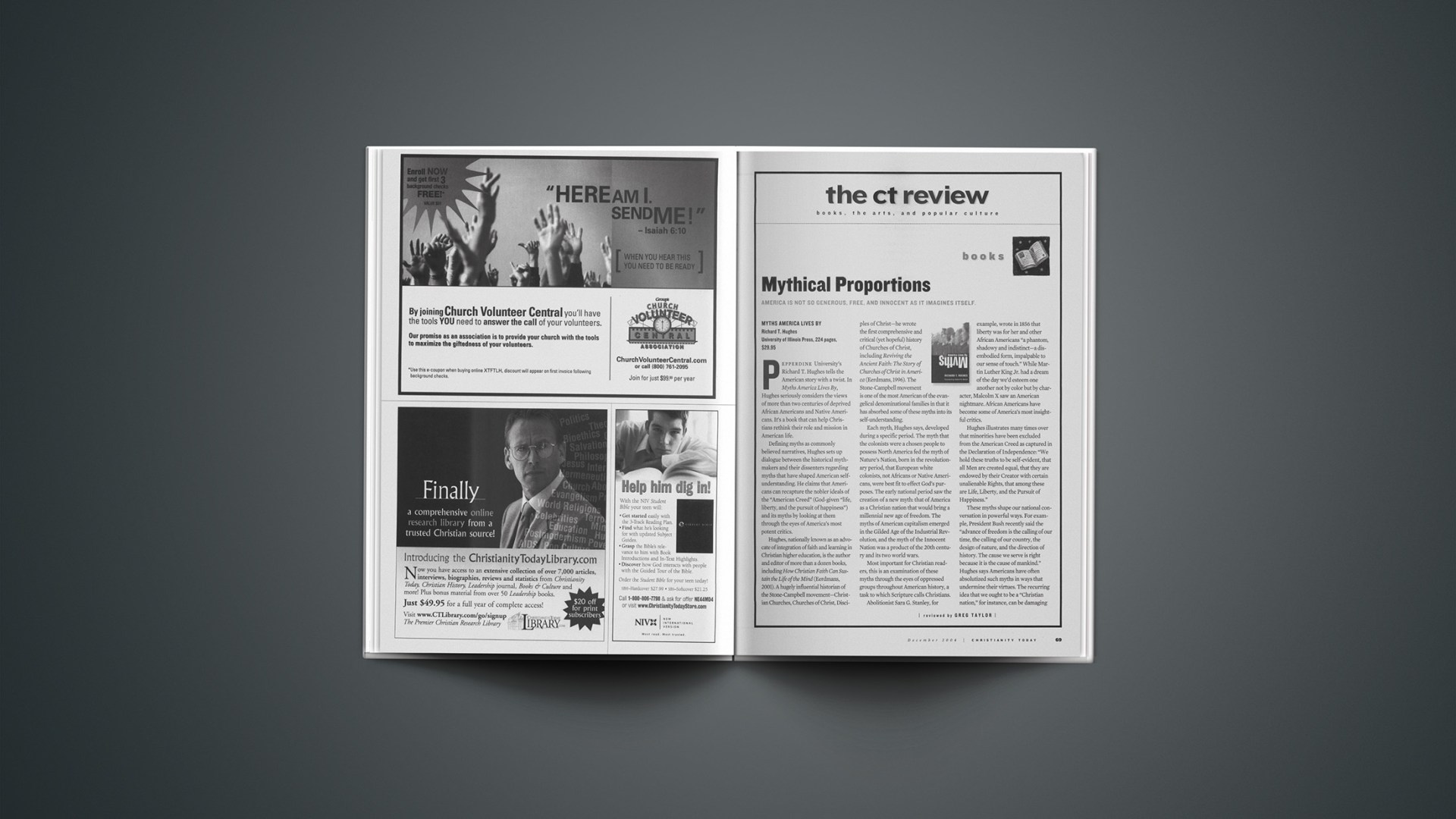Pepperdine University’s Richard T. Hughes tells the American story with a twist. In Myths America Lives By, Hughes seriously considers the views of more than two centuries of deprived African Americans and Native Americans. It’s a book that can help Christians rethink their role and mission in American life.
 Myths America Lives By by Richard T. Hughes University of Illinois Press, 224 pages, $29.95 |
Defining myths as commonly believed narratives, Hughes sets up dialogue between the historical mythmakers and their dissenters regarding myths that have shaped American self-understanding. He claims that Americans can recapture the nobler ideals of the “American Creed” (God-given “life, liberty, and the pursuit of happiness”) and its myths by looking at them through the eyes of America’s most potent critics.
Hughes, nationally known as an advocate of integration of faith and learning in Christian higher education, is the author and editor of more than a dozen books, including How Christian Faith Can Sustain the Life of the Mind (Eerdmans, 2001). A hugely influential historian of the Stone-Campbell movement—Christian Churches, Churches of Christ, Disciples of Christ—he wrote the first comprehensive and critical (yet hopeful) history of Churches of Christ, including Reviving the Ancient Faith: The Story of Churches of Christ in America (Eerdmans, 1996). The Stone-Campbell movement is one of the most American of the evangelical denominational families in that it has absorbed some of these myths into its self-understanding.
Each myth, Hughes says, developed during a specific period. The myth that the colonists were a chosen people to possess North America fed the myth of Nature’s Nation, born in the revolutionary period, that European white colonists, not Africans or Native Americans, were best fit to effect God’s purposes. The early national period saw the creation of a new myth: that of America as a Christian nation that would bring a millennial new age of freedom. The myths of American capitalism emerged in the Gilded Age of the Industrial Revolution, and the myth of the Innocent Nation was a product of the 20th century and its two world wars.
Most important for Christian readers, this is an examination of these myths through the eyes of oppressed groups throughout American history, a task to which Scripture calls Christians.
Abolitionist Sara G. Stanley, for example, wrote in 1856 that liberty was for her and other African Americans “a phantom, shadowy and indistinct—a disembodied form, impalpable to our sense of touch.” While Martin Luther King Jr. had a dream of the day we’d esteem one another not by color but by character, Malcolm X saw an American nightmare. African Americans have become some of America’s most insightful critics.
Hughes illustrates many times over that minorities have been excluded from the American Creed as captured in the Declaration of Independence: “We hold these truths to be self-evident, that all Men are created equal, that they are endowed by their Creator with certain unalienable Rights, that among these are Life, Liberty, and the Pursuit of Happiness.”
These myths shape our national conversation in powerful ways. For example, President Bush recently said the “advance of freedom is the calling of our time, the calling of our country, the design of nature, and the direction of history. The cause we serve is right because it is the cause of mankind.” Hughes says Americans have often absolutized such myths in ways that undermine their virtues. The recurring idea that we ought to be a “Christian nation,” for instance, can be damaging to the church, Hughes says: “The world might absorb bits and pieces of the Christian faith,” he writes, “while the church would absorb bits and pieces of the values common to the larger society. This is precisely what happened when Christians in the early 19th century sought to create an informal Christian establishment in the United States.”
He adds, “When the powerful in a nation cement their virtues and fail to see through the eyes of others, the poor and marginalized suffer.”
When it comes to the currently powerful myths—that America is unequivocally generous, free, and innocent—it’s the myth of innocence that most appalls Hughes. In the dark days following 9/11, he notes, college professors and politicians, who in light of souring world opinion called for re-examination of our foreign policies, were considered un-American. President Bush, on the other hand, embodied the myth of innocence when he said, “I’m amazed that there’s such misunderstanding of what our country is about that people would hate us. I am—like most Americans, I just can’t believe it because I know how good we are.”
Still, Hughes doesn’t think we should simply discard our myths. He argues that we should be reshaped by the original vision of the American Creed without swallowing it whole (especially in regard to innocence). His book is a wake-up call. He warns of the ditches on either side of the national identity debate: We should neither jettison the American Creed and myths nor absolutize them.
Neither should we take them for granted. Looking at each nation-shaping myth through the eyes of African Americans, Robert Bellah says in the foreword, we open ourselves to hearing the gospel, and the oppressed voices of the international community as well. The purpose of the book, Bellah points out, is that we learn to cope with our “chosenness”—the global city set on a hill.
The eyes of the rest of the world, Bellah says, are truly on us. Do we bring light or darkness, a blessing or a curse?
Greg Taylor is managing editor of New Wineskins magazine. He is author of the newly released novel High Places (Leafwood Publishers, 2004).
Copyright © 2004 Christianity Today. Click for reprint information.
Related Elsewhere:
Myths America Lives by is available from Amazon.com and other book retailers.
Richard Hughes’s other books mentioned in this essay, Reviving the Ancient Faith: The Story of Churches of Christ in America and How Christian Faith Can Sustain the Life of the Mind are also available from Amazon.com and other book retailers.










